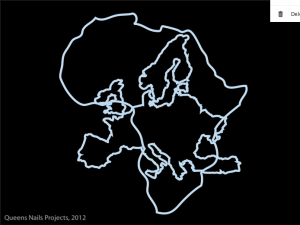This week I’ve had two encounters with scholars that push the boundaries of academic expression in favor of creative or experimental forms.
Over the weekend I read UT professor Ann Czvetkovich’s Depression: A Public Feeling. The book is part memoir, part scholarly work – what Jill Dolan calls a “critical memoir.” It is inspired, Czvetkovich writes, by “the desire to craft new forms of writing and knowledge that come from affective experience, ordinary life, and alternative archives and that don’t necessarily follow the usual methods of cultural critique» (23).
Last week I attended Fiamma Montezemolo’s talk Borderline Ethnography, hosted by the anthropology department at UT. Montezomolo is an anthropologist-turned-artist, or an artist-anthropologist, whose work revolves around art and the avant garde in Tijuana. As she tells it, she arrived in Tijuana with full faith in hybridity as a salvatory construct with which to confront border spaces and contact zones. What she found, instead, was a wall.
Concerned with the violence that scholars can do to border spaces when they impose idealistic ideas – like hybridity, or resistance – from outside, Montezemolo turned to creative non-fiction, film, and the visual arts to represent her research. For example in Echo, her most recent film project (not yet released), she tells the story of nine Tijuana artists who did work related to the border. Rather than focusing on the artists, however, her project incorporates responses from the people who observed, took part in, or even vandalized the original pieces. It is an ethnographic work, but one that constrains ethnographic and scholarly voices in favor of interview fragments and images.
“I couldn’t write a monograph. I couldn’t,” Montezemolo said, explaining her turn to alternate mediums of expression. For the most part, the audience seemed familiar with the debate over the limitations of the monograph as a form of representation. Thanks perhaps to the “writing culture” debates of the 1980s, this is a conversation that seems to be active and present in anthropology today.
I am less familiar, however, with how this conversation plays out in the study of literature. Is the monograph the ideal form for literary analysis? Are there other forms that scholars use to push the boundaries of scholarship and representation? What do you do when the monograph, the scholarly article, and the conference paper feel equally inadequate? Write a blog?


2 comentarios
This post has led to a lively conversation on Facebook and a number of references to relevant readings from anthropology and literary study. Here they are:
1. Malignant: How Cancer Becomes Us – (part memoir, part legal-historical ethnography)
2. Vita: Life in a Zone of Social Abandonment by Joao Biehl
3. the Matsutake Worlds Research Group: http://www.matsutakeworlds.org/
4. The Art of Cruelty: Maggie Nelson
5. the UT course «Narrative Journalism and Ethnography» taught by Cecilia Ballí
Write a blog sounds like a good option. I share the feeling that the field of literary studies is more «conservative» in this sense, and has a really hard time adapting even to problems of format. Whenever I have the chance to go to big conferences (another obsolete format) I notice that specially in the Spanish side of the field, there is a constant fear to sound un-academic, in any sense, and trying to produce non-traditional things in the field.
Last year an academic from Chile published a book that had a nice ring to these kind of experimentation. Her name is Rubí Carreño and her Book «Av. Independencia: Literatura, música e ideas del Chile disidente» (with a prologue by Dr. Luís Cárcamo-Huechante) is a nice example of mixing biographical, experimental and critical writing all in one.